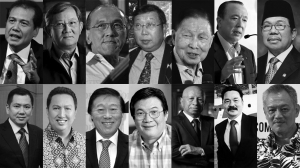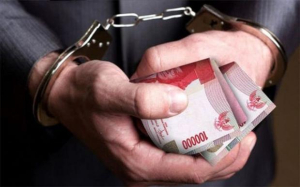Indonesia's anti-graft body weakened after law revisions
The Corruption Eradication Commission (KPK) was facing its most dire situation since its establishment in 2003 following the controversial revision to the KPK Law and the appointment of the anti-graft body new commissioners, activists said.
Students, activists and the public have strongly opposed the revision of the law, alleging it was part of a conspiracy by corrupt law enforcement officers and politicians to sabotage Indonesia's fight against corruption.
"The KPK has become weak," Benny Kabur Harman, a lawmaker of the Democratic Party who is a member of the House of Representatives' Commission II overseeing home affairs, told Indonesia Business Post on March 31, 2022.
Less sting operations
According to Transparency International Indonesia (TII), the Corruption Perception Index dropped three points from 40 to 37 in 2020 after the KPK law revision that people see as an effort to weaken the fight against corruption in the country.
Anti-graft activist Laola Ester from Indonesia Corruption Watch (ICW) said there were several indicators showing that the revised KPK law is eroding KPK as an enforcement agency.
An analysis by ICW, TII and the Centre for Anticorruption Studies at Yogyakarta-based Gadjah Mada University (Pukat UGM) identifies those indicators as the decrease in sting operations, the granting of authority by KPK to terminate cases, light indictment by prosecutor and the change of the status of KPK employees to that of civil servants, as well as the collapse of the independence of KPK, Ester explained.
TII researcher Alvin Nicola said the number of sting operations have declined in the last two years following the revision of the KPK law and the new KPK leadership.
KPK conducted six sting operations in 2021, according to ICW data, including the arrest of South Sulawesi Governor Nurdin Abdulah and several regents. This number is relatively low compared with KPK's sting operations in the previous years. These included 17 sting operations in 2016, 19 sting operations in 2017, 30 sting operations in 2018, 21 in 2019 and seven in 2020.
Sting operations were the backbone of KPK's past efforts to uncover graft cases. Moreover, in most sting operations, the suspects were always declared guilty by the court and send to prison.
This decline resulted from several factors, including the lack of commitment of the current KPK leaders in supporting sting operations. The KPK team's information leakage, the internal conflict within KPK and the negligence of the leaders regarding threats received by their personnel also contributed to the decline.
Termination of corruption case
TII researcher Wawan Suyatmiko said that KPK, with its authority to terminate a case, used Law No. 19/2019 on the KPK to halt investigation against Syamsul Nursalim and his wife, Itjis Nursalim.
Bank Dagang Negara Indonesia (BDNI) owner Sjamsul Nursalim and his wife Itjih Nursalim were named suspects in the case in June 2019 through the notorious Bank Indonesia Liquidity Support (BLBI) scheme. The Supreme Audit Agency (BPK) estimated that the alleged graft caused a whopping IDR4.58 trillion in state losses.
The cases of the Nursalims were the first case terminated by the KPK using its authority to cease investigations. Under the previous KPK Law No. 30/2002, the anti-graft body was not authorized to suspend an inquiry to ensure prudence in early studies and prevent abuse of power.
Lighter sentence demand
With the appointment of new commissioners, KPK now tend to issue light indictments. Nicola believed KPK prosecutors were reluctant to charge suspects with optimum sentence demands, especially for those with political or public service backgrounds.
Citing an example, he said the KPK only demanded 11 years of imprisonment for former social affairs minister Juliari Batubara for his corruption of social assistance funds during the COVID-19 pandemic. The Jakarta Corruption Court found him guilty for accepting IDR32.48 billion in bribes. He was sentenced to 12 years' imprisonment and a fine of IDR500 million.
According to ICW data, in average, the anti-graft body only demands corruption suspects to be sentenced to four years and 10 months imprisonment in 2020. The number decreased from the previous year's average sentence demand of five years and two months.
Changing employment status
As part of the revisions to the KPK law, the anti-graft body is now placed under the supervision of the executives, changing all KPK employees status into civil servants. KPK was formerly an independent body established by Law No. 30/2002.
According to ICW, the change has resulted in the loss of independence of the KPK. Today, KPK employees coordinate with the Administrative and Bureaucratic Reform Ministry and the National Civil Service Agency (BKN).
Due to the change in the status, KPK employees are more vulnerable to being transferred if their investigation of a corruption case impacts those with high and strategic positions within the government.
In October 2021, KPK fired 51 employees after failing the civic education test required for their appointment as civil servants. Senior investigators with high-profile case track record are among those being expelled.
Activists strongly condemned the decision, accusing the KPK as part of a government campaign to weaken the institution.
KPK Spokesman Fikri Ali denied the allegations. He argued the public needed to understand that the fight against corruption was not limited to repressive measures such as sting operations that take action against suspects.
In 2021, the KPK recovered IDR80 billion from corrupt individuals. In addition, eradicating corruption involves coordinated and simultaneous efforts through prevention, coordination, supervision and monitoring, including law enforcement. Compared to the previous year, the number of assets recovered is up by 27%.
Ali also denied the allegation that the 51 employees being expelled was part of an effort to weaken the KPK.
"There was no such thing. The transfer of employees' status is required by the law and was completed following the existing law. It has also been judicially reviewed by the Constitutional Court and the Supreme Court," he said.
Already have an account? Sign In
-
Start reading
Freemium
-
Monthly Subscription
30% OFF$26.03
$37.19/MonthCancel anytime
This offer is open to all new subscribers!
Subscribe now -
Yearly Subscription
33% OFF$228.13
$340.5/YearCancel anytime
This offer is open to all new subscribers!
Subscribe now






